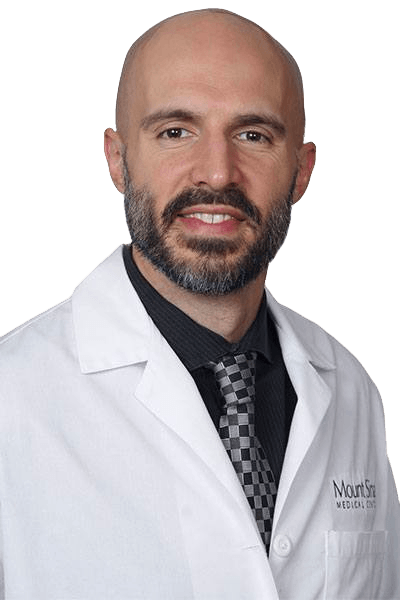Mount Sinai leads new study on how exercise can improve cardiac function and longevity.
Have you ever wondered why most smartphones come equipped with health monitoring apps and devices designed for workouts? One key feature offers real-time feedback on the intensity of your workout: heart rate monitoring. Your heart rate is one key piece of information that helps gauge whether to increase or decrease the activity for a safe and effective workout. Because of this, exercise capacity stands out as one of the most crucial indicators of cardiovascular health.
New evidence suggests that the true heart benefits of staying fit depend on the health of cardiac mechanics, which is how the heart muscle pumps blood and the factors influencing heart function. At the Columbia University Division of Cardiology at Mount Sinai Medical Center, experts employ cardiac ultrasound imaging (echocardiography) as the main method to evaluate heart function.
Dr. Christos G. Mihos, Director, Echocardiography Laboratory, Columbia University Division of Cardiology at Mount Sinai Medical Center spearheads “Effects of Exercise and Fitness on Left Ventricular Torsion and Wall Mechanics After Myocardial Infarction Study (FIT-TWIST).” This trial has enrolled around 50 patients with coronary artery disease who have experienced a heart attack), which results in a major disruption of cardiac mechanics. It is funded and supported by a research grant from the Florida Heart Research Foundation. The study is the first of its kind.
To delve deeper, cardiologists at Mount Sinai are using an advanced technique known as 2D speckle-tracking echocardiography. This technology offers a nuanced understanding of cardiac motion by measuring the subtle movements of the heart, like shortening and twisting.
Dr. Mihos assesses the effects of a standard cardiac rehabilitation program. The program is made up of 36 sessions of graded exercise over 12 weeks, which aims to restore cardiac normalcy. The theory is that by participating in cardiac rehabilitation after a heart attack, a patient can significantly improve post-event survival by improving cardiac mechanics.
Dr. Mihos shares in more detail the purpose of the study and what it hopes to accomplish:
Q: When will the study be completed and where do you anticipate publishing?
A: We anticipate completion by the summer, presentation in the late fall, and submission for consideration in the Journal of the American Heart Association or Journal of the American Society of Echocardiography.
Q: Why should the average person care about the study, and what do you hope the results will show them? How would the findings benefit folks who harbor concerns about exercising after a cardiac event, fearing that exercise may trigger another one?
A: The heart is a muscle. The most complex muscle, but a muscle like any other. If you train it, you can reap significant health benefits. This includes patients who have had a cardiac event, particularly heart attacks or heart failure. Cardiac rehab and exercise retrains the muscle to work efficiently and to use nutrients and oxygen to its best capacity.
Q: How will this change the standard of care moving forward?
A: We hope the insight gained from our study will allow us to tailor rehab specifically and may provide data to support an NIH application for heart failure and cardiomyopathy patients.
Q: Do most people after experiencing a heart attack attend rehabilitation as part of their recovery? If not, does the study aim to encourage rehab participation?
A: Most patients are prescribed rehab, but most do not go out of fear, lack of understanding of its benefit, and sometimes underappreciation regarding its benefits from the treating and referring physicians. We hope to shed light and help educate our community, patients and doctors alike, on the benefits that simple activity and movement can provide to our hearts.



